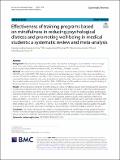Use este identificador para citar ou linkar para este item:
https://repositorio.fepecs.edu.br:8443/handle/123456789/956| Tipo: | Artigo de Periódico |
| Título: | Efectiveness of training programs based on mindfulness in reducing psychological distress and promoting well-being in medical students: a systematic review and meta-analysis |
| Título(s) alternativo(s): | Efetividade dos programas de treinamento baseados na Atenção Plena na redução do sofrimento psicológico e promoção do bem-estar em estudantes de medicina: revisão sistemática e meta-análise |
| Autor(es): | Silva, Cláudia Cardoso Gomes da Bolognani, Cláudia Vicari Amorim, Fábio Ferreira Imoto, Aline Mizusaki |
| Abstract: | Background Medical schools have used mindfulness meditation as a strategy to assist students in stress management. This study aimed to seek evidence regarding the efectiveness of mindfulness-based training programs in reducing psychological distress and promoting the well-being of medical students. Methods We conducted a systematic review and meta-analysis. Cochrane Library, Embase, PubMed/MEDLINE, PsycINFO/PsycNet, LILACS/BVS, ERIC (ProQuest), Web of Science, OpenGrey, and Google Scholar were searched for randomized clinical trials published until March 2022, without time or language restrictions. Two authors independently screened the articles, extracted data using a standardized extraction form, and assessed the methodological quality of the included studies using the Cochrane’s Risk of Bias 2 (ROB 2) tool and the quality of evidence using the Grading of Recommendations Assessment, Development, and Evaluation (GRADE) tool. Results Of the 848 articles retrieved, 8 met the inclusion criteria. Mindfulness-based training improved the outcomes: mindfulness (small post-intervention efect: SMD=0.29; 95% CI: 0.03 to 0.54; p=0.03; I 2=46%; high evidence quality, and small efect at follow-up: SMD=0.37; 95% CI: 0.04 to 0.70; p=0.03; I 2=53%; low evidence quality), psychological well-being/health (there was no statistically signifcant diference between the groups in the post-intervention efect: SMD= −0.27; 95% CI:−0.67 to 0.13; p=0.18; I 2=76%; moderate evidence quality, and a signifcant diference at follow-up: SMD= −0.73; 95% CI:−1.23 to−0.23; p=0.004; I 2=61%; low evidence quality), and stress (small post-intervention efect: SMD= −0.29; CI of 95%:−0.56 to−0.02; p=0.04; I 2=57%; moderate evidence quality, and moderate efect at follow-up: SMD= −0.45, 95% CI:−0.67 to−0.22, p=0.0001, I 2=0%, moderate evidence quality). The quality of evidence for the anxiety, depression, and resilience outcomes is low and for the empathy outcome, very low. Conclusion The results indicate that the students who participated in the mindfulness training perceived improvements in the stress and psychological distress symptoms and improved health perception and psychological wellbeing. However, the signifcant heterogeneity among studies should be considered when interpreting these fndings. |
| Palavras-chave: | Educação médica Estudantes de medicina Estudantes de graduação em medicina Saúde psicológica Saúde mental Gerenciamento de estresse |
| CNPq: | CNPQ::CIENCIAS HUMANAS::PSICOLOGIA |
| Idioma: | por |
| País: | EUA |
| Editor: | BMC Public Health |
| Sigla da Instituição: | BMC |
| Citação: | Silva, C.C.G., Bolognani, C.V., Amorim, F.F. et al. Effectiveness of training programs based on mindfulness in reducing psychological distress and promoting well-being in medical students: a systematic review and meta-analysis. Syst Rev 12, 79 (2023). Doi: https://doi.org/10.1186/s13643-023-02244-y. Disponível em: https://rdcu.be/dbugh. Acesso em: 08 de abr. 2024. |
| Tipo de Acesso: | Acesso Aberto |
| URI: | https://repositorio.fepecs.edu.br:8443/handle/123456789/956 |
| Data do documento: | 5-Mai-2023 |
| Aparece nas coleções: | Artigos publicados em periódicos - MA |
Arquivos associados a este item:
| Arquivo | Descrição | Tamanho | Formato | |
|---|---|---|---|---|
| Silva_et_al-2023-Systematic_Reviews.pdf | ARTIGO_MA_effectivenesscardosoclaudia | 2,19 MB | Adobe PDF |  Visualizar/Abrir |
Os itens no repositório estão protegidos por copyright, com todos os direitos reservados, salvo quando é indicado o contrário.

